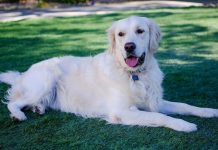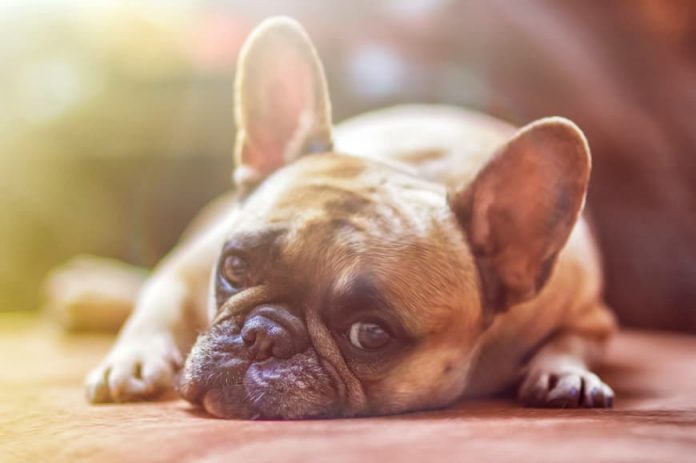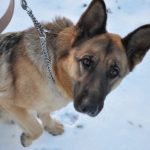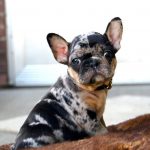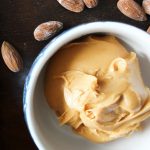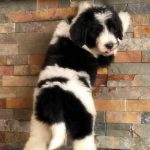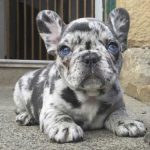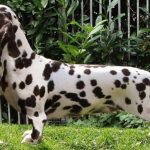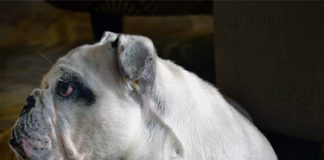Bulldogs are known for their large and square short-muzzled head, broad chest and shoulders, short tail and thick, strong limbs. This medium-size dog has tiny folded back ears and round eyes. Bulldogs are kind, affectionate and brave. They are playful and friendly, but they can beprotective of their owners.
This breed tends to be inactive inside the house. They prefer to sleep and snore next to their owner. Bulldogs have to be exercised daily to keep them fit. Some people have trouble picking them up because they are quite heavy. Mature female bulldogs weigh about 40 pounds, while males weigh approximately 50 pounds.
How Much Do Bulldogs Shed?
Do bulldogs shed? Yes! They do shed, however, not as much as other dogs. This is because they have a short and smooth coat. Bulldog shedding is less conspicuous on the furniture and floor, but more noticeable on dark clothing.
If you let your bulldog sit on your lap while you are wearing dark pants, expect to see visible hairs on them. Bulldogs are average shedders, so cleaning up their hair is rather easy. Puppies usually shed more than adult bulldogs. Their shedding slows down as they grow older, provided that they are given proper grooming.
Some dogs are also more susceptible to shedding due to genetics. You should choose a bulldog from a reputable breeder, so you don’t get a dog with genetic coat problems. Bulldogs shed twice a year, during fall and spring.
Shedding is especially heavy in early spring and late winter. If the shedding problem lasts for only a few months, you don’t need to worry about anything. You can just buy a high quality vacuum to make cleaning easier for you. If you see signs of baldness or if your dog sheds excessively over many months, there might be an underlying problem.
What Causes Excessive Shedding in Bulldogs?
Excessive shedding can be caused by various reasons. If you want to know the exact reason, your best option is to go to the vet. They can determine if the shedding is a symptom of an underlying disorder or a natural part of the dog’s growth process.
Excessive shedding is usually caused by certain medications, parasites, food-related allergies, bacterial or fungal infections, sunburn, lactation or pregnancy or contact with caustic or irritating substances.
Other possible causes of excessive sheddinginclude cancer, self-induced trauma caused by licking, improper nutrition and adrenal,kidney, thyroid or liver diseases.
If the shedding is caused by improper nutrition, you can try different types and brands of food and see how your dog reacts. You should take your dog to the vet if the shedding is accompanied by other abnormalities such as open sores, skin redness or irritation,balding,persistent licking or scratching and dry hair.
How to Treat Excessive Shedding
Bulldogs often have food sensitivities or allergies that manifest through skin infections and excessive shedding. As such, it is important to check the ingredients of his food. If you have a bulldog puppy, find a high quality food that contains protein.
Avoid those types of food that contain artificialsweeteners and colors, grains and byproducts. If your dog hasfood sensitivities or allergies, changing its food can reduce shedding and improve its coat. Here are other possible ways to treat excessive shedding in bulldogs.
Oatmeal Baths
Bathe your bulldog once a week or once a month. If he’s been playing outside a lot and getting dirty, you should give him a bath. You can also reward him after his bath. Since bulldogs have sensitive skin, you should avoid using shampoo that contains harsh chemicals.
Don’t use shampoo for humans because it’s too strong and can irritate the skin of your dog. Oatmeal baths are not only safe, but can also make their coat and skin healthier. Don’t bathe them too often because doing so might have the reverse effect. Too much bathing will wash away the naturaloils in their skin and leave it flaky and dry.
Omega-3 and 6 Supplements
Bulldogs might be shedding because they don’t have enough omega-6 and 3 fatty acids in their diet. Omega-6 and 3 fatty acids can help reduce shedding and improve their coat as well. Flaxseed, fish,kale, spinach and other green leafy vegetables are rich in omega-3s.
Fatty acid supplements and salmon oil are also good sources of omega-6 and 3s. If your bulldog sheds a lot despite eating fish-based food, you can add flaxseed oil or fish oil supplements to his diet.
Proper Grooming
Although their short coat doesn’t get tangled, bulldogs still need regular brushing. Use a fine brush that has compact bristles to get rid of any loose hair in your dog’s coat. Run the brush down your arms. If you don’t like the brush, chances are your dog won’t like it either.
You don’t have to trim or cut their coat, which makes them easy to groom. Just brush them every week to keep their coat healthy and shiny. When you are brushing his coat, make sure to check for rashes, sores, tenderness, redness, swelling and signs of infection on the feet and in the ears, mouth, eyes and nose.
The dog’s ears should not release a foul odor or have too much gunk or wax inside and the eyes shouldn’t have any discharge or redness. Examining your dog every week will help you see potential health concerns early.
Give Him Nutritious Food
You should watch for any signs of allergy in your dog, especially when you feed him something new. If he has any negative reaction such as shedding, you should change what he eats.
Shedding is never a pleasant experience, but bulldogs are much better than most breeds. If you notice excessive shedding, don’t panic. Give your dog a few weeks to adjust to any changes.
If he still sheds excessively, you should take him to the vet for a consultation. Fleas, parasites and skin infections can cause excessive bulldog shedding and these problems require proper medication.





